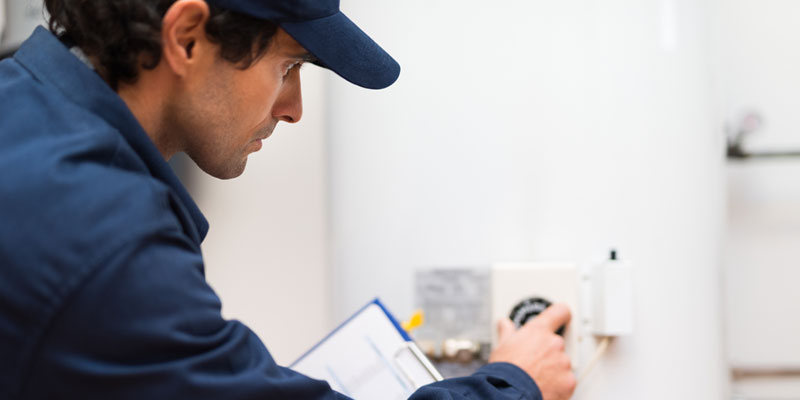There are many reasons why your water heater might not be producing enough hot water for your household. The water heater might be too small for your household’s usage or the settings could need adjustment. Sediment buildup, broken elements, and leaks can be the root cause of the lack of hot water when you need it.
By determining the source of your problem, you get one closer to fixing it and back to enjoying your long hot showers and hot water needed for dishes, laundry, and other tasks around the house.
The Size of Your Tank
If you find yourself constantly in competition with the rest of the household to get in the shower first or find yourself yelling down the hallway not to start the laundry as you head for a shower, chances are your heater is simply too small for your household usage. If you use more water than the tank can provide, then your heater spends 20 to 30 minutes reheating new water. If your water heater is too small for your needs, you’ll have to replace it with a bigger one or replace it with a tankless option. A tankless water heater heats up water as you need it, and it brings hot water to your appliances quickly—and never runs out.
Adjust Your Tank Settings
Every water heater has a thermostat that dictates how hot your water will get. It works just a normal household thermostat for heating, you set how hot you want the water and the heating elements will heat to that temperature. If you’re not getting any hot water at all, the thermostat may be set too low or malfunctioning. As a guide, the standard temperature for most water heaters is 140 degrees F, but the Department of Energy recommends turning down the temperature to 120 degrees to save energy.
Most water heaters have a reset button. Troubleshooting your thermostat is as easy as clicking that button. In case that doesn’t work, locate the thermostat itself and make sure it’s set correctly. If you still have the owner’s manual, the manufacturer should have included the settings inside. If you’re like most people and you have no idea where the original manual is, you should be able to find the settings online by searching the make and model of the water heater. Reset to the heat you want, then try resetting again. If that still doesn’t do the trick, give us a call.
Sediment Buildup
If your water tends to randomly switch between hot and cold temperatures, regardless of what you set the shower to, there may be sediment build-up in the water heater’s tank. If you have hard water, old pipes, or if your anode rod is worn out then sediment tends to build up even faster. This sediment build-up leaves less space for hot water in the tank and can absorb heat generated by the heating element.
We recommend flushing and draining the tank to remove the sediment and restore the hot water in your home. Our pros at Bodenheimer Plumbing can help with that!
Broken Elements
Typically, water heaters have two heating elements: one at the top of the tank and one at the bottom of the tank. The purpose of the top element is to repeatedly re-heat the water near the top of the tank. The purpose of the bottom element is to heat all the water added to the tank to store it at a constant temperature.
If your bottom heating element breaks and stops working, it isn’t able to heat the majority of the water in your tank properly. Instead, you’re left to rely only on the small portion that the top heating element heats. That water quickly runs out and you’re left surprised in the shower when the water turns from hot to cold in a matter of seconds!
Leaks
A leak in your hot water heater can lead to hot water running out faster than you’d like. Small leaks can occur in the hot water lines themselves, but larger leaks can stem from holes or cracks in the hot water tank itself.
If you suspect your tank may be leaking, stand beside the water heater tank. Many times you can hear a leak before any sign of water damage is apparent. If you hear water rushing or dripping while you stand beside your water heater, follow the sound and search for visual confirmation of a leak. If you can hear water, but no leak is apparent, there may be a break inside the tank.
Call Bodenheimer Plumbing
Did any of these make you have an “A-Ha!” moment? Our team of seasoned professionals can help you with your problem, whether it is a leak in your water tank, an upgrade to a tankless water heater, or simply looking at your tank settings. If you’re still having questions about your hot water, don’t worry, we can come out to your home or business and diagnose the problem and get you back to living comfortably! Give us a call at 336-788-3966 or contact us online today.


